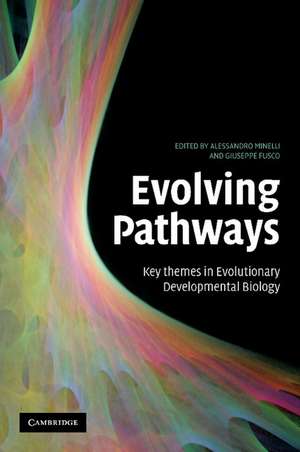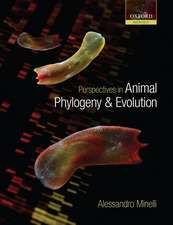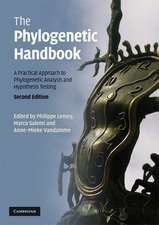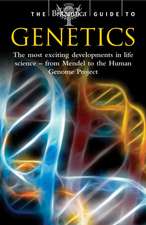Evolving Pathways: Key Themes in Evolutionary Developmental Biology
Editat de Alessandro Minelli Autor Giuseppe Fuscoen Limba Engleză Paperback – 18 iul 2012
| Toate formatele și edițiile | Preț | Express |
|---|---|---|
| Paperback (1) | 431.78 lei 6-8 săpt. | |
| Cambridge University Press – 18 iul 2012 | 431.78 lei 6-8 săpt. | |
| Hardback (1) | 898.16 lei 6-8 săpt. | |
| Cambridge University Press – 9 ian 2008 | 898.16 lei 6-8 săpt. |
Preț: 431.78 lei
Nou
Puncte Express: 648
Preț estimativ în valută:
82.62€ • 86.44$ • 68.63£
82.62€ • 86.44$ • 68.63£
Carte tipărită la comandă
Livrare economică 02-16 aprilie
Preluare comenzi: 021 569.72.76
Specificații
ISBN-13: 9781107405455
ISBN-10: 1107405459
Pagini: 446
Dimensiuni: 152 x 229 x 23 mm
Greutate: 0.59 kg
Editura: Cambridge University Press
Colecția Cambridge University Press
Locul publicării:New York, United States
ISBN-10: 1107405459
Pagini: 446
Dimensiuni: 152 x 229 x 23 mm
Greutate: 0.59 kg
Editura: Cambridge University Press
Colecția Cambridge University Press
Locul publicării:New York, United States
Cuprins
Preface; Introduction: pathways of change; Part I. Thinking about Evolution by Taking Development Seriously: 1. Evo-devo as a discipline Gerd B. Müller; 2. Making evolutionary predictions about the structure of development and morphology: beyond the neo-Darwinian and constraints paradigms Isaac Salazar-Ciudad; 3. Conflicting hypotheses on the nature of mega-evolution Wallace Arthur; 4. Prospects of evo-devo for linking pattern and process in the evolution of morphospace Paul M. Brakefield; 5. The molecular biology underlying developmental evolution Claudio R. Alonso; 6. Evo-devo's identity: from model organisms to developmental types Ronald A. Jenner; Part II. Evo-Devo - Materials and Methods: 7. A pragmatic approach for selecting evo-devo model species in Amniotes Athanasia Tzika and Michel C. Milinkovitch; 8. On comparisons and causes in evolutionary developmental biology Gerhard Scholtz; 9. Evolution and development: towards a synthesis of macro- and micro-evolution with ecology Hans Zauner and Ralf J. Sommer; 10. When is a hox gene not a hox gene? The importance of gene nomenclature David E. K. Ferrier; 11. Plants are used to having identity crises Rolf Rutishauser, Valentin Grob and Evelin Pfeifer; Part III. Evolving Diversity: 12. Unravelling body-plan and axial evolution in the bilateria with molecular phylogenetic markers Jaume Baguñà, Pere Martinez, Jordi Paps and Marta Riutort; 13. Are transposition events at the origin of the bilaterian hox complexes? Jean S. Deutsch and Philippe Lopez; 14. Many roads lead to Rome: different ways to construct a nematode Einhard Schierenberg and Jens Schulze; 15. Basal Euarthropod development: a fossil-based perspective Nigel C. Hughes, Joachim Haug and Dieter Waloszek; 16. Developmental transitions during the evolution of plant form Jane A. Langdale and C. Jill Harrison; Part IV. Evolving Body Features: 17. Urbisexuality: the evolution of bilaterian germ cell specification and reproductive systems Cassandra G. M. Extavour; 18. Thoughts and speculations on the ancestral arthropod segmentation pathway Ariel D. Chipman; 19. Evolution of neurogenesis in arthropods Angelika Stollewerk; 20. Arthropod appendages: a prime example for the evolution of morphological diversity and innovation Nikola-Michael Prpic and Wim G. M. Damen; 21. Ontogeny of the spiralian brain Claus Nielsen.
Recenzii
"This is a book rich and diverse in content, which renders it impossible to do justice to every individual chapter in the context of a book review."
Olivier Rieppel, Evolution & Development
Olivier Rieppel, Evolution & Development
Descriere
This is an integrated overview of a diverse range of approaches to studying 'evo-devo', for researchers and graduate students.














